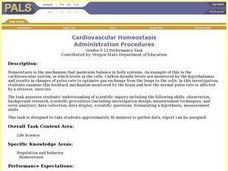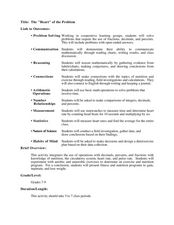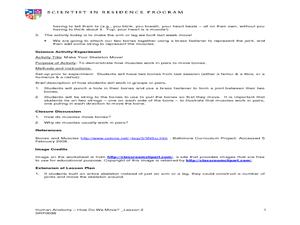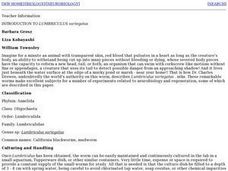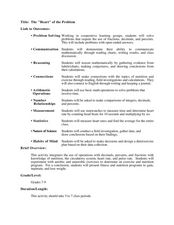Curated OER
Circulation
In this circulatory system activity, students design an experiment to test the circulation of six of their friends. They select and exercise to increase circulation, take pulse and blood pressure readings from each person before and...
Curated OER
The Effect of Math Anxiety on Cardiovascular Homeostasis
Students examine the effect stress due to test anxiety may have on the heart. As part of the experiment, students hypothesize, collect data, graph data, analyze data and formulate an understanding of their personal level of stress and...
Curated OER
Cricket Dissection
Learners conduct an experiment to test the effects of various chemicals on breathing and to practice animal dissection. They carefully dissect house crickets to identify the breathing structures and determine their rate of respiration....
Curated OER
Lightening the Load
Students explore a study of African women who are able to carry heavy loads by altering their gait; they then conduct experiments that study the relationship between exertion, weight and heart rate.
Curated OER
Cardiovascular Homeostasis
High schoolers develop and conduct an experiment to answer the question," How does cardiovascular exercise affect the pulse rate?". They record the changes to heart rate during different levels of exercise.
Curated OER
Drugged Out Daphnia
Ninth graders participate in experiments to investigate the the effects of nicotine, caffeine, aspirin, alcohol, and sleeping pills on the heart rates of Daphina. They describe the relationships between common drugs and heart rates....
Curated OER
The "Heart" of the Problem
Students explore mathematical operations while studying nutrition. For this physical fitness lesson, students explore calories, pulse rate, and the circulatory system. Students use mathematical data to create a healthy physical fitness...
Curated OER
Pulse Rates
Students answer the question, "How will the intensity of exercise effect your heart rate?", using physical workouts and AppleWorks, or similar spreadsheet program. This lesson can conclude with the creation of a graph of data collected.
Curated OER
Using Imagery To Introduce the Endocrine System
Students listen with closed eyes to a story that starts in a relaxed tone and ends in a scream. They list the body reactions they experience: fast heart rate, shaking, etc. and hypothesize the reason for the reactions. They explore the...
Curated OER
The Blood Flow through the Heart and Body
Students discuss the importance of the circulatory system and how drugs and alcohol can affect our bodies. They interact with a CD ROM and then outline their bodies and label the parts of their heart and the blood vessels throughout the...
Curated OER
Human Anatomy - How Do We Move?
Fifth graders discover how blood moves around the body. In this circulatory system lesson, 5th graders feel their pulse before and after exercise. Students count their heart rate. Students use the scientific method to record their...
Curated OER
Ins and Outs of Respiration
Students determine their respiratory rate and explore the factors that affect breathing rate.
Curated OER
The Amazing Race
Students improve their directional awareness by locating sites and symbols on a map. They increase their heart rates while traveling to each site and performing the specified task/exercise at each site.
Curated OER
Summer Activities: Our Amazing Bodies
Students use the body as a sensory laboratory to explore their five senses, heartbeat, bones, and even size. In this early childhood science lesson plan, students build science and critical thinking skills as they take part in up to 6...
Curated OER
Rate That Snack!
In this nutrition worksheet, students keep track of all snacks eaten for a three day period. Students record the name of the snack, nutritional information, where and when it was eaten, and a rating by the student.
Curated OER
Introduction to Lumbriculus variegatus
Students conduct two set experiments on Lumbriculus worms and create a third experiment of their own. The first of the two set experiments allows students to observe regeneration of the worms while the second allows students to test the...
Texas Instruments
Can You Breathe Like a Pinniped?
Young learners compare the breathing patterns of different animals in this pinniped lesson. They examine the breathing pattern of California sea lions and northern elephant seals. Pupils collect, compare and analyze data concerning...
Curated OER
Does Music Cam the Savage Beast?
Students collect, graph and analyze data. For this statistics lesson, students measure the heart beat of a person as they listen to music. They use the CBL and TI to create a graph, analyzing the outcome.
Curated OER
FACS: Exercise Physiologist
Present the exciting career of an exercise physiologist to your teens with a PowerPoint. The slide show explains what this professional does, the education required, the job atmosphere, salary range, and prospects. Finally, viewers will...
Curated OER
Finding a Line of Best Fit
Pupils engage in the practice of creating a scatter plot with the data obtained from measuring different resting heart rates. The data is used to create the table that is translated into a graph. The lesson gives instructions for the use...
Kenan Fellows
Unit 4: The Brain
Drugs interact with the brain to alter moods, emotions, and behaviors by changing the brain's chemistry, perceptions, and interactions. The final lesson in the Pharmacology unit shows scholars experiments, has them complete four labs,...
Curated OER
A Beating Heart
Learners collect and analyze data using percent difference. In this algebra lesson, students relate the concepts of algebra to cardiac physiology.
Curated OER
The "Heart" of the Problem
Students create an exercise and nutrition program. In this interdisciplinary lesson, students use calculations of exercises plus their corresponding effects on the body and nutritional values of food to derive a health plan. Students...
Federal Reserve Bank
Deflation: Who Let the Air Out?
Why do decreasing prices (deflation) restrain economic growth, and why is this a real concern? Here you'll find reading materials and a related worksheet that gets right to the heart of this question, using recent events and real...






